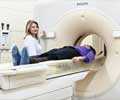While the significance of multi-tasking is increasing day by day, researchers at the University of New Hampshire say that it is possible to predict when a person will prove to be an
Researchers at the University of New Hampshire say that it is possible to predict when a person will prove to be an efficient multi-tasker using brain scans.
The researchers say that they scanned some people's brains using functional magnetic resonance imaging (fMRI), and were able to predict when the subjects would be poor multi-taskers and optimal multi-taskers."We typically sacrifice efficiency when we multitask. However, there are times when we're quite good at it. Unfortunately, not much has been known about how to predict when these periods of time will occur," said Andrew Leber, assistant professor of Psychology.
In their study report, published in the Proceedings of the National Academy of Sciences, the researchers say that the changes in performance were more dramatically preceded by changes in the participants' brain activity patterns.
Higher levels of activity in brain regions such as the basal ganglia, anterior cingulate cortex, prefrontal cortex, and parietal cortex corresponded to better multi-tasking performance.
"What is so striking about this result is that brain activity predicted multitasking performance before participants even knew whether they would be asked to switch or repeat tasks," Leber said.
Although these findings indicate that brain imaging may be useful for maximizing productivity in people's daily lives, the researchers agree that they do not provide a truly practical solution quite yet.
However, the researchers insist that their study may inform scientists' understanding of neurological disorders like Parkinson's disease, which is marked by degeneration of the basal ganglia.
"We've known that multitasking suffers when the physical makeup of the basal ganglia degenerates over time, as in Parkinson's disease. However, the current study shows that even in healthy adults, short-term changes in the basal ganglia also impact multitasking," Leber said
The researchers say that this observation opens new potential avenues in studying normal brain functioning to help provide a more complete picture of the disordered functioning in Parkinson's disease.
Source-ANI
RAS/M
 MEDINDIA
MEDINDIA




 Email
Email










